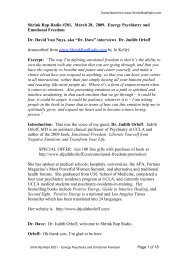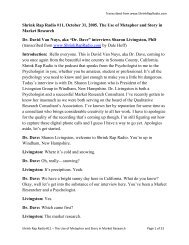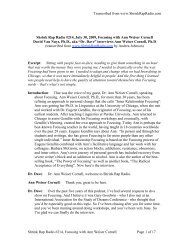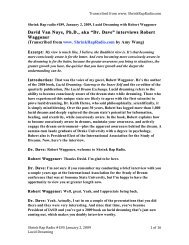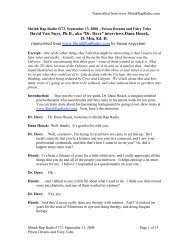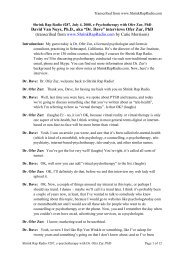interviews John Beebe, MD - Shrink Rap Radio
interviews John Beebe, MD - Shrink Rap Radio
interviews John Beebe, MD - Shrink Rap Radio
Create successful ePaper yourself
Turn your PDF publications into a flip-book with our unique Google optimized e-Paper software.
Transcribed from www.<strong>Shrink</strong><strong>Rap</strong><strong>Radio</strong>.com<br />
enough. But there, Hitchcock has shown a side of himself that’s very different.<br />
And I think Tippi Hedren illustrated that to him and probably fascinated him as he<br />
was trying to get closer to that thing that was not like the Alfred Hitchcock we<br />
know. It’s some other part of him.<br />
Dr. Dave: Interesting. Let’s – I know that you’ve written quite a bit about The Wizard<br />
of Oz, and that’s a film that I’m sure everybody has seen. So, let’s talk about The<br />
Wizard of Oz in terms of the archetypes that appear there. And of course, the<br />
question that comes to my mind is, are these archetypes expressive of the author,<br />
Frank Baum, or of the director? And I don’t remember who the director is of that<br />
film.<br />
<strong>Beebe</strong>: Well, you don’t remember who the director is because we don’t know who the<br />
director is.<br />
Dr. Dave: Oh! (laughs)<br />
<strong>Beebe</strong>: And there we begin to get the minutes of the auteur theory that everybody who<br />
has encountered it… If we do everything archetypal in terms of – even my own<br />
language that you quoted – archetypes in someone, we start seeing <strong>John</strong> <strong>Beebe</strong>’s<br />
anima, or Alfred Hitchcock’s opposing personality – we completely miss the fact<br />
that “in” and “out” are very relative terms, and that’s not always the way psyche<br />
always expresses itself. We have a sort of myth of the individual that’s maybe<br />
taken us a little too far afield of the fact that we’re all interacting with each other all<br />
the time, and we live in a culture. So, in a sense, a great movie can be the<br />
manifestation of an entire culture. So, I would almost say American culture<br />
dreamed The Wizard of Oz to life through the magnificent medium of the MGM<br />
Studios.<br />
Dr. Dave: Hmm.<br />
<strong>Beebe</strong>: There is the auteur Mervyn LeRoy, who was this great producer. George Cukor<br />
worked on the film for a while, but he wasn’t on the film for very long. Victor<br />
Fleming, who also signed Gone With the Wind, but Cukor had also worked on that<br />
before he called Clark Gable “darling” and was fired from the film… (laughs)<br />
Dr. Dave: (laughs)<br />
<strong>Beebe</strong>: That’s the gossip, anyway, but the point is, Cukor didn’t finish Gone With the<br />
Wind, nor did he finish The Wizard of Oz, and Victor Fleming signed both of them.<br />
But is it E.“Yip” Harburg who wrote the wonderful lyrics to the songs, from “Over<br />
the Rainbow” to “We’re Off to See the Wizard” to “If I Only Had a Brain” – all<br />
those wonderful songs. In other words, who’s the auteur? It’s kind of a miracle<br />
that the movie is dreamed into being, and one really feels that the ultimate auteur is<br />
sort of American culture, and that that movie beautifully distills themes in the<br />
American psyche. And that’s why it becomes the great American film that we all<br />
<strong>Shrink</strong> <strong>Rap</strong> <strong>Radio</strong> #166, August 1, 2008 Page 12 of 18<br />
A Jungian View of the Feminine in Film



